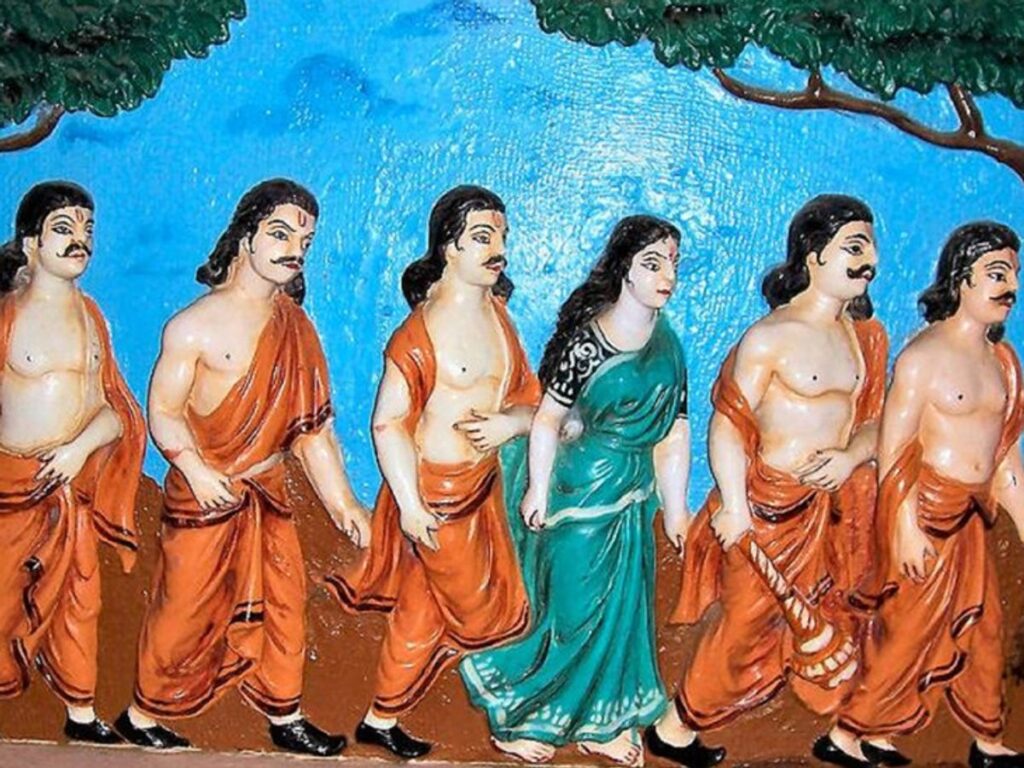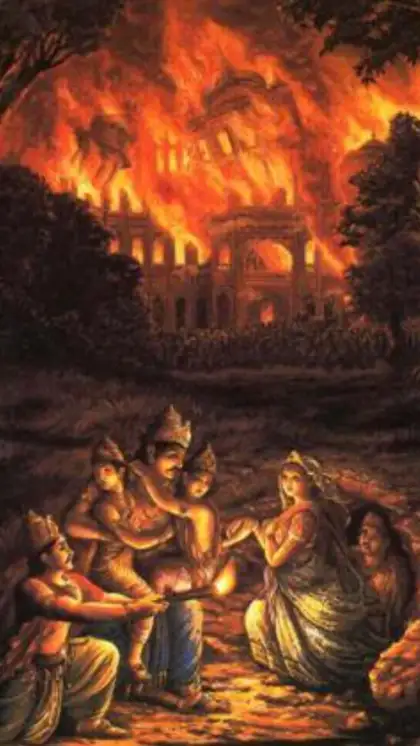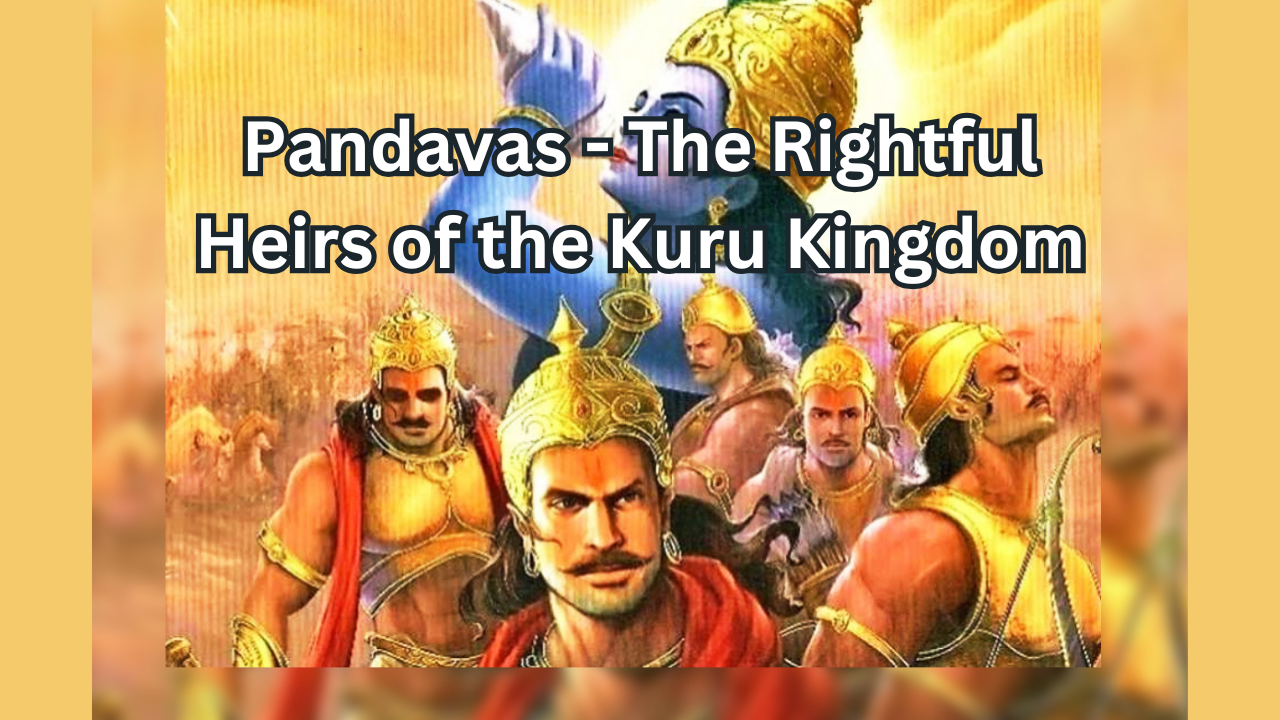The story of the Pandavas is not just a historical or mythological account; it is a timeless narrative that teaches us about righteousness (Dharma), perseverance, and the deep-rooted spiritual principles that govern life. The Pandavas, the five sons of King Pandu, were the rightful heirs of the Kuru Kingdom, yet their journey was anything but straightforward. They were tested through exile, deceit, and battle, but their unwavering commitment to Dharma made them victorious in the end.
In this blog, I want to explore why the Pandavas were the rightful heirs of the Kuru Kingdom, who they were, what made their claim legitimate, and how their journey reflects the eternal struggle between Dharma and Adharma (righteousness and unrighteousness). We’ll also dive into some key incidents that define their spiritual and moral strength.
Who Were the Pandavas?
The Pandavas were the five sons of King Pandu and his two wives, Kunti and Madri. They were:
- Yudhishthira – The eldest and the embodiment of truth and Dharma.
- Bhima – The strongest of the brothers, known for his immense physical power and appetite.
- Arjuna – The greatest archer and warrior, devoted to Lord Krishna.
- Nakula – The most handsome and skilled in swordsmanship.
- Sahadeva – The wisest among them, known for his knowledge of astrology.
Each of these brothers had their own strengths, but what united them was their deep commitment to righteousness and their role in upholding the moral order of the universe.

Why Were the Pandavas the Rightful Heirs of the Kuru Kingdom?
The question of inheritance in the Mahabharata is one of the biggest points of conflict. The Pandavas, as the sons of King Pandu, were the natural heirs. However, due to the untimely death of Pandu and the political ambitions of their uncle, Dhritarashtra, and his son, Duryodhana, their claim was constantly challenged.
1. The Lineage Argument
The Kuru dynasty was a prestigious lineage, and traditionally, the eldest son of the ruling king would inherit the throne. However, Pandu, despite being the younger brother of Dhritarashtra, was crowned as king because Dhritarashtra was born blind and considered unfit to rule. After Pandu’s death, his sons—the Pandavas—should have rightfully inherited the kingdom.
However, Dhritarashtra’s son, Duryodhana, refused to acknowledge their claim. His argument was that since Pandu had renounced the throne and lived in the forest, his sons had no right to rule. This was a twisted justification fueled by greed and insecurity.
2. The Moral Argument
Yudhishthira, as the eldest Pandava, was the epitome of Dharma. He never lied, never broke a promise, and was a just ruler. On the other hand, Duryodhana, despite being the son of a king, was consumed by jealousy, arrogance, and a sense of entitlement.
A famous incident that reflects this difference in character is when Lord Krishna offers both Yudhishthira and Duryodhana a choice between his army and himself (Krishna) as an advisor. Yudhishthira, with his unwavering faith in Dharma, chooses Krishna’s wisdom over material power. Duryodhana, blinded by ego, chooses the army. This decision alone shows who was more fit to rule.
3. The Spiritual Argument
One of the most profound lessons from the Mahabharata is that Dharma always prevails. The Pandavas, despite facing numerous injustices—being exiled, humiliated, and deceived—always upheld their Dharma. Lord Krishna himself stood by them, which signifies that their path was aligned with cosmic righteousness.
The Bhagavad Gita, which Krishna imparted to Arjuna on the battlefield of Kurukshetra, is a spiritual masterpiece that teaches us about duty, righteousness, and devotion. Arjuna’s initial reluctance to fight against his own relatives reflects a deep moral dilemma, but Krishna’s guidance—”You have a right to perform your duty, but not to the fruits of your actions”—reminds us that true leadership is about responsibility, not personal gain.
Key Incidents That Define the Pandavas’ Right to Rule
1. The Lakshagraha (House of Lac) Incident
Duryodhana, unable to kill the Pandavas directly, devised a plan to burn them alive in a palace made of lac (a highly flammable material). However, the Pandavas, forewarned by Vidura, escaped and lived in exile for a while. This incident shows how Duryodhana’s leadership was built on deceit, while the Pandavas survived by their intelligence and righteousness.

2. The Game of Dice and Exile
Yudhishthira, bound by his love for fairness, was deceived into a rigged game of dice by Shakuni, Duryodhana’s uncle. The Pandavas lost everything, including their kingdom and their freedom, and were forced into exile for 13 years. Despite the unfairness, they honored their word and spent their time in exile without rebellion, proving their commitment to truth.
3. Draupadi’s Humiliation
One of the darkest moments in the Mahabharata was when Draupadi, the wife of the Pandavas, was disrobed in the Kaurava court after Yudhishthira lost her in the game of dice. The Kauravas’ lack of respect for women and righteousness showed the depths of their Adharma. Lord Krishna’s divine intervention to protect Draupadi reaffirmed that Dharma would eventually win.
4. The Kurukshetra War
After countless attempts to peacefully reclaim their kingdom, the Pandavas were forced into war. The Kurukshetra war was not just a battle for territory but a cosmic battle between Dharma and Adharma. The Pandavas, under Krishna’s guidance, emerged victorious, reinstating the rule of righteousness.
Read More : Famous Characters of Mahabharata
Spiritual Lessons from their Journey
1. Dharma Always Prevails
The Mahabharata teaches us that righteousness may face challenges, but it will always triumph in the end. The Pandavas faced extreme difficulties, but their adherence to Dharma led them to ultimate victory.
2. Detachment and Duty (Bhagavad Gita’s Message)
Krishna’s teachings to Arjuna highlight an important spiritual lesson: perform your duty without attachment to the results. This is not just a lesson for warriors but for all of us in everyday life.
3. True Leadership is Rooted in Justice
A leader is not one who seeks power but one who upholds fairness and justice. Yudhishthira’s leadership was rooted in Dharma, making him a rightful king.
Final Thoughts
The Pandavas were not just warriors but embodiments of truth, resilience, and righteousness. Their journey was filled with trials, but their unwavering commitment to Dharma made them the rightful heirs of the Kuru Kingdom. Their story is a powerful reminder that truth and justice may face obstacles but will always triumph in the end.
In our own lives, we often face dilemmas where choosing the right path is difficult. The Pandavas’ journey reminds us that righteousness may not always bring immediate rewards, but in the grand scheme of life, it is the only path worth walking.
As Krishna tells Arjuna in the Bhagavad Gita: “When righteousness declines and unrighteousness prevails, I manifest myself to restore Dharma.”
The story of the Pandavas is not just about a kingdom—it is about the eternal battle of good over evil, and the ultimate victory of Dharma. Let’s take inspiration from their journey and strive to walk the path of truth in our own lives.

